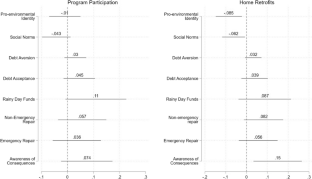Energy Efficiency ( IF 3.1 ) Pub Date : 2024-03-23 , DOI: 10.1007/s12053-024-10211-2 Adam Mayer , Ellison Carter

|
Municipal governments, often in collaboration with utilities, have implemented a range of energy efficiency programs to encourage homeowners and businesses to adopt energy efficiency upgrades. Energy efficiency holds promise to reduce energy consumption, reduce greenhouse gas emissions, improve public health, and reduce energy bills. However, these programs often suffer from poor participation and have typically had limited success. In this analysis, we use novel data to understand the relationship between social norms, pro-environmental identity, and household finances to understand program participation and retrofit decision-making. We find that the variables that predict retrofit decision-making do not explain a household’s initial decision to contact an energy efficiency program. We suggest that the processes that drive households to contact energy efficiency programs—a necessary first step in improving energy efficiency—are different from the processes that explain why households decide to upgrade their homes.
中文翻译:

社会规范、环保身份和财务:是什么促使家庭参与能源效率计划?
市政府通常与公用事业公司合作实施了一系列能源效率计划,以鼓励房主和企业采用能源效率升级。能源效率有望减少能源消耗、减少温室气体排放、改善公众健康和减少能源费用。然而,这些项目的参与度往往较低,并且通常取得的成功有限。在本分析中,我们使用新颖的数据来了解社会规范、环保身份和家庭财务之间的关系,以了解项目参与和改造决策。我们发现预测改造决策的变量并不能解释家庭参与能源效率计划的最初决定。我们认为,推动家庭参与能源效率计划的过程(提高能源效率必要的第一步)与解释家庭决定升级房屋的过程不同。



























 京公网安备 11010802027423号
京公网安备 11010802027423号